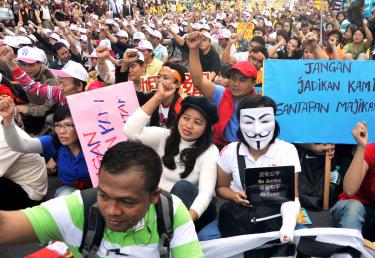Thousands of workers, students and social activists yesterday threw eggs toward the Presidential Office in Taipei during a protest about various economic and social issues, after launching five parades across the city.
“Fuck the government. It’s garbage,” thousands of demonstrators assembled on Ketagalan Boulevard chanted in unison as they moved toward the Presidential Office.
As they reached police barricades that stopped them about 300m away from the Presidential Office building itself, they began to throw eggs.
Thousands of eggs were thrown over the barricades, accompanied by angry shouts, cheers and whistles.
Zhongzheng First Precinct Police Chief Fang Yang-ning (方仰寧), the commander of the police force at the scene, immediately declared that egg-throwing violated the Assembly and Parade Act (集會遊行法) and asked the crowd to stop or to disband.
However, the protesters continued and soon the ground was covered with egg yolk and cracked eggshells.
Prior to the rally in front of the Presidential Office, the demonstrators had marched across the city in five parades, each representing a social dilemma — including “merchandization” of education, racial discrimination, forced land seizures, a development-oriented economy and deteriorating social insurance systems.
“The demonstration today is a demonstration for all members of the working class and incorporates issues concerning education, environmental protection, agriculture and racial discrimination,” longtime labor activist Lin Tzu-wen (林子文) told the crowd. “In recent years, the government has been leaning more and more toward capitalists, while overlooking the suffering of the general public. It’s time for us to remind them to pay more attention to the people, not the few.”
Taiwan International Workers Association spokesman Hsu Chia-chuan (許家雋) said the government’s recent economic policies sought to trim labor costs by weakening protections for blue-collar foreign workers, while relaxing restrictions on white-collar foreign workers.
“This is not only racial discrimination, but also class discrimination,” Hsu said.
Some of the policies the government is mulling include lowering the threshold on businesses hiring foreign workers and excluding blue-collar foreign workers from the minimum wage.
“So many different groups concerned about different issues are assembled here, because we all face one core issue — the right-wing tendency of this government,” Raging Citizens Act Now spokesperson Lai Hsiang-ling (賴香伶) said.
She said the government was turning education into a commodity, making it increasingly expensive to go to school.
She also said the government was trying to import more cheap labor from overseas, exploiting foreign and domestic workers alike to benefit big business.
“The government is seizing farmland to make way for factories once big corporations demand it. The government is allowing industrial tycoons to expand capacity at expense of the environment,” she said. “Because the government predicts that the labor insurance fund may collapse within two decades, the solution it comes up with is to ask workers to pay higher premiums, accept lower pensions and retire at an older age, while it continues to give tax breaks and other favorable measures to capitalists.”
A retired manager of a Taipei-based trading company surnamed Chang (張) said he came out not only to show his anger against the government, but also his solidarity with his children.
“When I was young, I always believed that you could have a successful life if you worked hard enough, but it doesn’t seem to be the case nowadays,” he said. “My son is an electrical engineer, he works hard, but he still lost his first job when his company moved across the Strait. Not long after he started his second job, he was put on unpaid leave by his boss for some time because of the bad economy.”
“It’s Sunday today, but he still cannot come here, because he’s working overtime on a Sunday shift — he works hard, actually, he works even harder than I did, but I don’t feel as hopeful for him as I did when I was his age,” Chang said.
Source: Taipei Times - 2012/11/26





















